牛津深圳版英语九年级上册 Module 1 Unit 1 Wise men in history 第3课时 Grammar 课件 (共50张PPT)
文档属性
| 名称 | 牛津深圳版英语九年级上册 Module 1 Unit 1 Wise men in history 第3课时 Grammar 课件 (共50张PPT) | 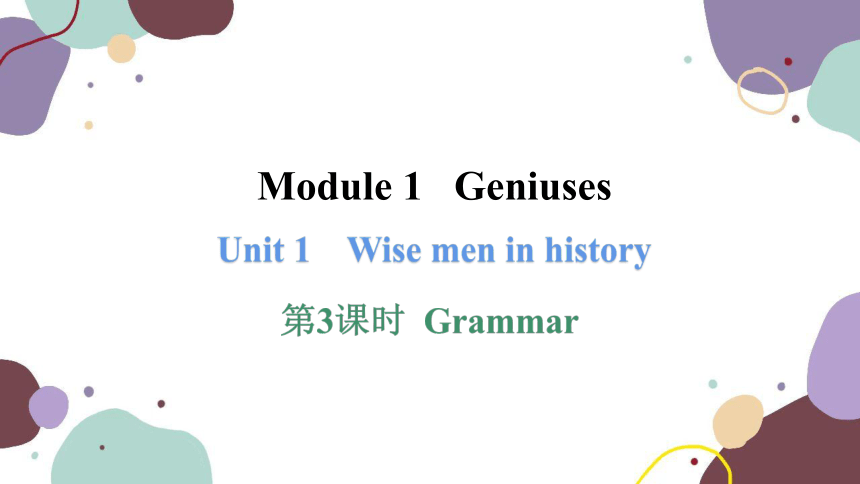 | |
| 格式 | pptx | ||
| 文件大小 | 268.9KB | ||
| 资源类型 | 教案 | ||
| 版本资源 | 牛津深圳版 | ||
| 科目 | 英语 | ||
| 更新时间 | 2023-08-03 23:39:35 | ||
图片预览


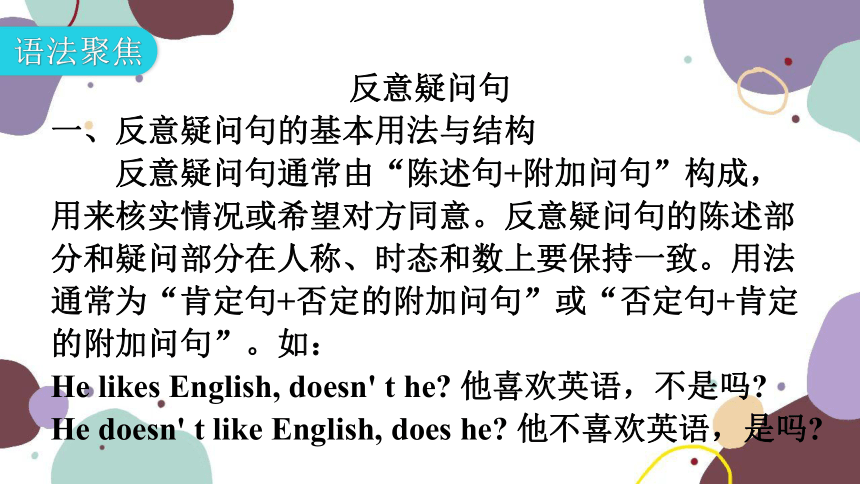
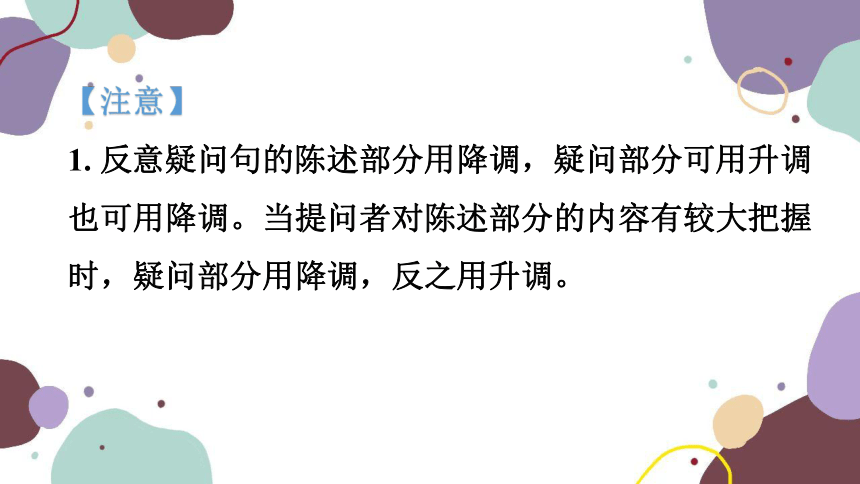
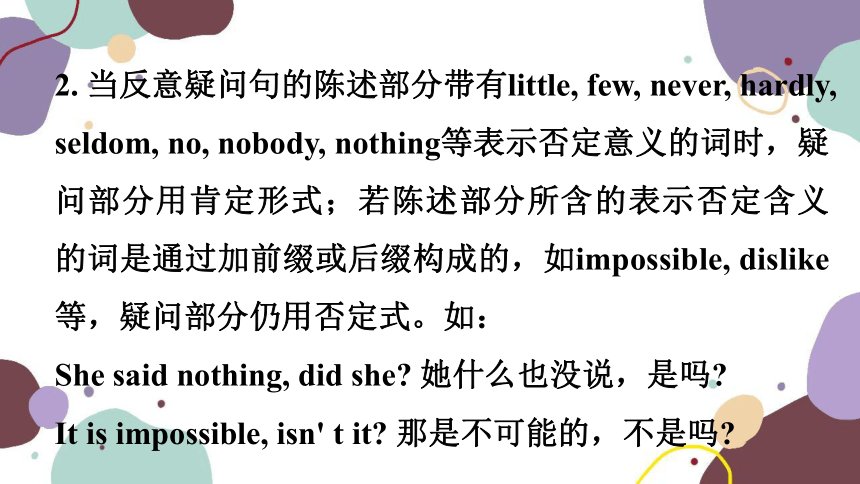
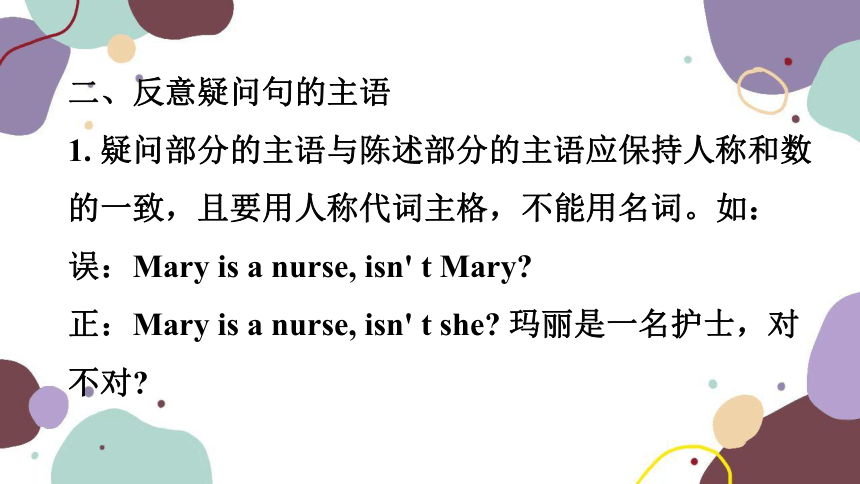
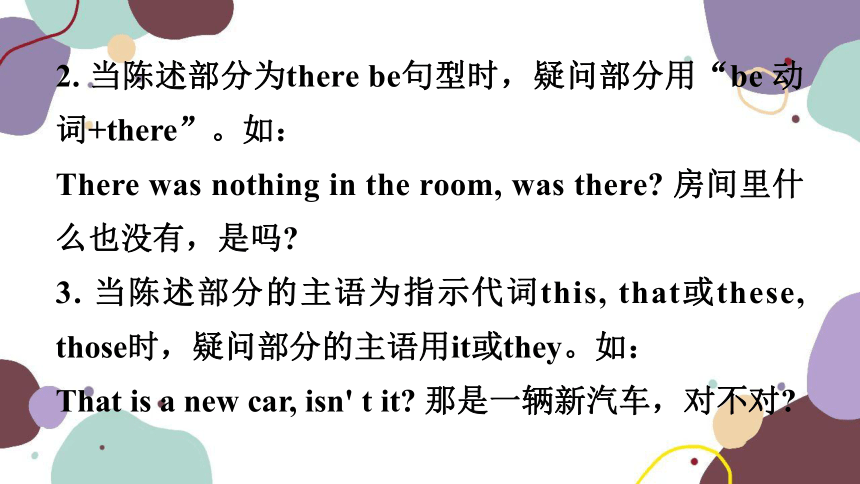
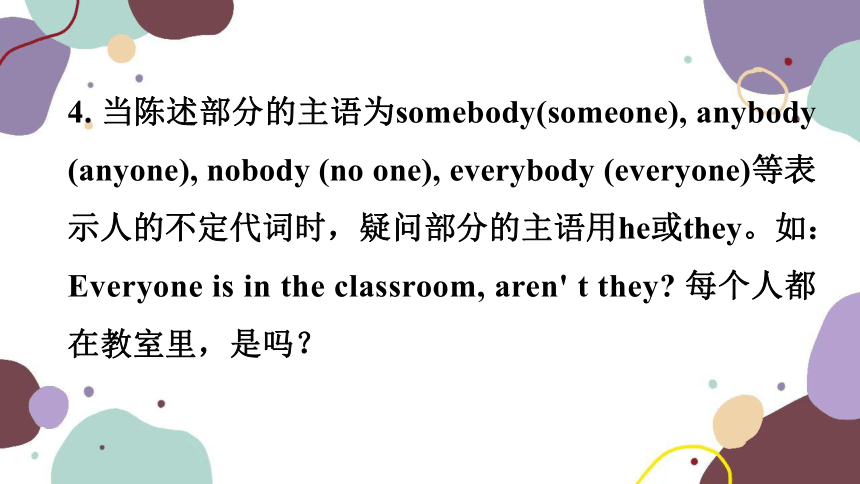
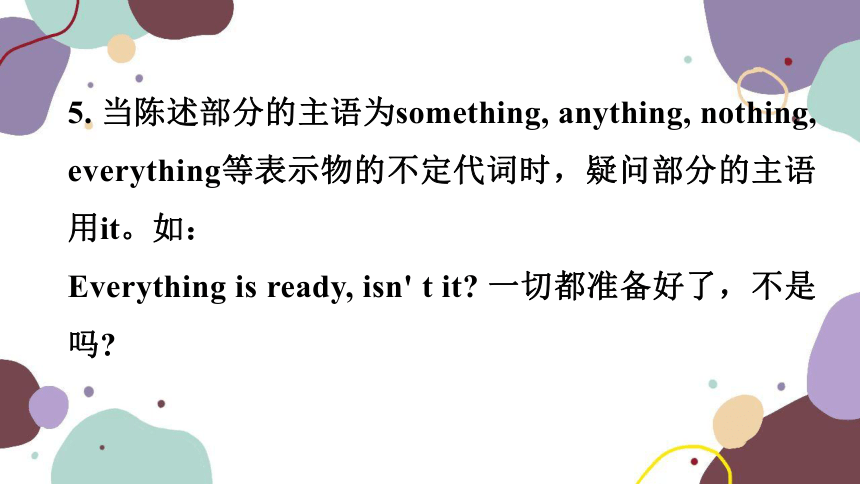
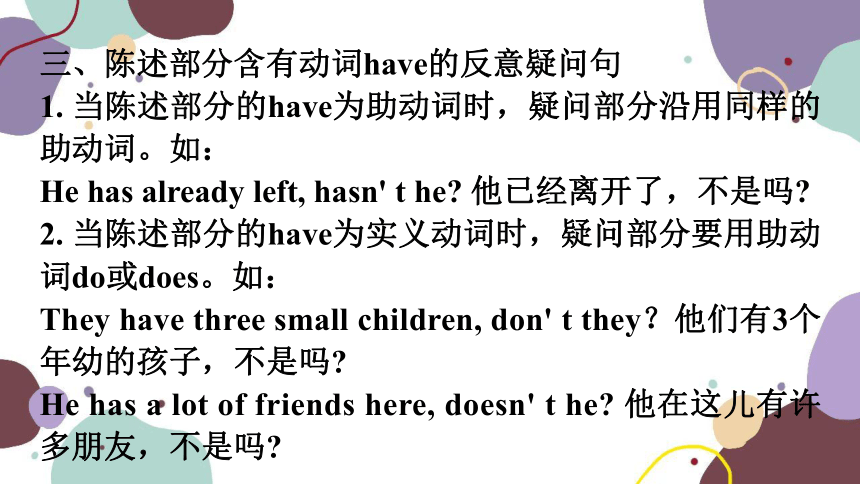
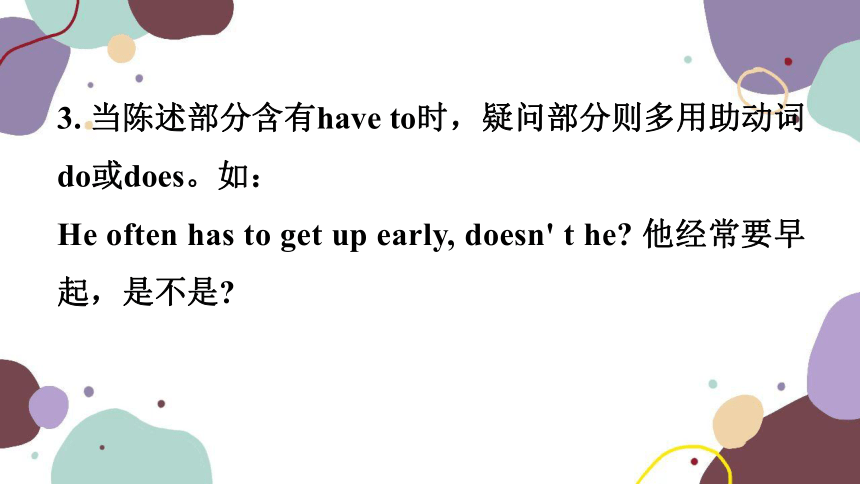
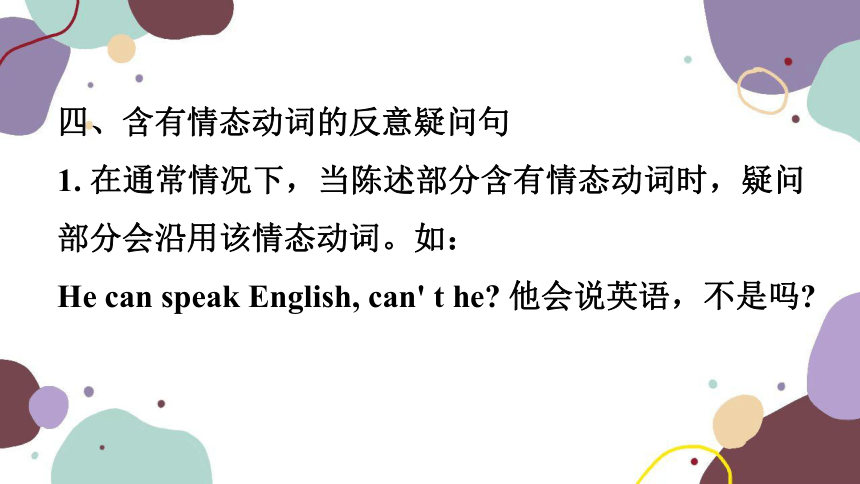
文档简介
(共50张PPT)
Module 1 Geniuses
Unit 1 Wise men in history
第3课时 Grammar
目录
02
课堂练习
01
语法聚焦
语法聚焦
反意疑问句
一、反意疑问句的基本用法与结构
反意疑问句通常由“陈述句+附加问句”构成,用来核实情况或希望对方同意。反意疑问句的陈述部分和疑问部分在人称、时态和数上要保持一致。用法通常为“肯定句+否定的附加问句”或“否定句+肯定的附加问句”。如:
He likes English, doesn' t he 他喜欢英语,不是吗
He doesn' t like English, does he 他不喜欢英语,是吗
【注意】
1. 反意疑问句的陈述部分用降调,疑问部分可用升调也可用降调。当提问者对陈述部分的内容有较大把握时,疑问部分用降调,反之用升调。
2. 当反意疑问句的陈述部分带有little, few, never, hardly, seldom, no, nobody, nothing等表示否定意义的词时,疑问部分用肯定形式;若陈述部分所含的表示否定含义的词是通过加前缀或后缀构成的,如impossible, dislike等,疑问部分仍用否定式。如:
She said nothing, did she 她什么也没说,是吗
It is impossible, isn' t it 那是不可能的,不是吗
二、反意疑问句的主语
1. 疑问部分的主语与陈述部分的主语应保持人称和数的一致,且要用人称代词主格,不能用名词。如: 误:Mary is a nurse, isn' t Mary
正:Mary is a nurse, isn' t she 玛丽是一名护士,对不对
2. 当陈述部分为there be句型时,疑问部分用“be 动词+there”。如:
There was nothing in the room, was there 房间里什么也没有,是吗
3. 当陈述部分的主语为指示代词this, that或these, those时,疑问部分的主语用it或they。如:
That is a new car, isn' t it 那是一辆新汽车,对不对
4. 当陈述部分的主语为somebody(someone), anybody (anyone), nobody (no one), everybody (everyone)等表示人的不定代词时,疑问部分的主语用he或they。如: Everyone is in the classroom, aren' t they 每个人都在教室里,是吗?
5. 当陈述部分的主语为something, anything, nothing, everything等表示物的不定代词时,疑问部分的主语用it。如:
Everything is ready, isn' t it 一切都准备好了,不是吗
三、陈述部分含有动词have的反意疑问句
1. 当陈述部分的have为助动词时,疑问部分沿用同样的助动词。如:
He has already left, hasn' t he 他已经离开了,不是吗
2. 当陈述部分的have为实义动词时,疑问部分要用助动词do或does。如:
They have three small children, don' t they?他们有3个年幼的孩子,不是吗
He has a lot of friends here, doesn' t he 他在这儿有许多朋友,不是吗
3. 当陈述部分含有have to时,疑问部分则多用助动词do或does。如:
He often has to get up early, doesn' t he 他经常要早起,是不是
四、含有情态动词的反意疑问句
1. 在通常情况下,当陈述部分含有情态动词时,疑问部分会沿用该情态动词。如:
He can speak English, can' t he 他会说英语,不是吗
2. 当陈述部分含有must时,要分两种情况:
(1)若must表示“必须”或“有必要”,则疑问部分用needn' t。但若mustn' t表示“禁止”,则疑问部分要用must。如:
You must leave at once, needn' t you 你必须马上离开,对不对
You mustn' t laugh, must you 你不准笑,知道吗
(2)若must表示推测,则疑问部分通常要根据must后面的动词结构采用相应的形式。如:
He must be tired, isn' t he 他一定很累,不是吗
五、陈述部分为祈使句的反意疑问句
1. 若陈述部分为祈使句,疑问部分常用will you。如:
Please help us, will you 请帮帮我们,好吗
Don' t forget to post the letter, will you 别忘了寄信,好吗
2. 当祈使句以Let' s (听者包括在内)开头时,疑问部分常用shall we。如:
Let' s go there together, shall we 我们一起去,好吗 3. 当祈使句以Let us (听者不包括在内)开头时,疑问部分常用will you。如:
Let us know your address, will you 把你的地址告诉我们,好吗
六、陈述部分为主从复合句的反意疑问句
1. 当陈述部分为主从复合句时,疑问部分一般应与主句保持一致。如:
He said that he didn' t like it, didn' t he 他说他不喜欢它,是不是
He knows where I live, doesn' t he 他知道我住在哪里,是不是
2. 当陈述部分为I think (believe, suppose) that …等时,疑问部分通常与从句保持一致(注意否定的转移)。如: I think that it is too short, isn' t it 我认为它太短了,对不对
I don' t think he will come, will he 我认为他不会来,对吗
【注意】
这类用法主要限于主语为第一人称且think等动词为一般现在时的情形。
七、几种特殊情况的反意疑问句
1. 当陈述部分为I' m … 时,疑问部分通常用aren' t I。如:
I' m wrong, aren' t I 我错了,不是吗
2. 当陈述部分为I wish … 时,疑问部分通常用may I。如:
I wish to go with them, may I 我想同他们一起去,可以吗
3. 当陈述部分有had better时,疑问部分应用hadn' t开头。如:
He' d better leave here, hadn' t he 他最好离开这儿,不是吗
八、反意疑问句的回答
反意疑问句的回答,无论问题的提法如何,都要根据事实回答。如果事实是肯定的,就用yes;如果事实是否定的,就要用no。要特别注意的是,当陈述部分为否定式、疑问部分用肯定式提问时,英语回答的yes或no与汉语意思正好相反,即这种省略回答的yes要译成“不”,no要译成“是”。如:
—He doesn' t like playing football, does he 他不喜欢踢足球,对不对?
—Yes, he does. / No, he doesn' t. 不,他喜欢。/ 是的,他不喜欢。
句子的种类
一般来说,句子按用途来分,可分为陈述句、疑问句、祈使句和感叹句四种。而陈述句又分为肯定句和否定句;疑问句分为一般疑问句,特殊疑问句,选择疑问句和反意疑问句。
一、陈述句——用来陈述事实
1. 肯定句
(1) 主谓结构。如:The sun is rising in the east. 太阳正从东方升起。
(2) 主谓宾结构。如:He broke his leg in an accident. 他在一次事故中摔断了腿。
(3) 主系表结构。如:Good medicine tastes bitter. 良药苦口。
(4) 主谓双宾结构。如:He will give us a talk on the history of Africa. 他将给我们作一个关于非洲历史的演讲。
(5) 主谓复宾结构。如:I found the street lined with many people. 我发现街道上站了许多人。
2. 否定句
(1)当句子中的谓语动词含有情态动词或助动词时,在它们的后面加not 构成否定句。如:They shouldn' t treat the boy like that. 他们不应该那样对待那个男孩。
(2)当句子中的谓语动词为实义动词且没有情态动词或助动词时,用do / does / did+not构成否定句。如: He didn' t find his mistakes about the problem. 他没有发现自己在这个问题上的错误。
(3)句中含有hardly,seldom, never等否定词。如:
I can hardly believe it. 我几乎不敢相信。
(4)两者全部否定用neither 或nor。如:
Neither of them knows French. 他们都不懂法语。
(5)三者以上的全部否定用none, nothing, nobody, no one 等;三者以上部分否定用 all / always / every等+not。如:
Nobody agrees with what he said. All that glitters is not gold. 没有人同意他所说的话。闪光的不一定都是金子。
二、疑问句——用来提出问题
1. 一般疑问句要将助动词或情态动词提到主语前,且用yes / no 回答。如:
—Did you attend the party 你参加晚会了吗?
—Yes, I did. 是的,我参加了。
—No, I didn' t. 不,我没有参加。
2. 特殊疑问句(特殊疑问词+一般疑问句),不用yes / no 回答,而应问什么答什么。如:
—How many people are there in the room 房间里有多少人?
—None. 一个人都没有。
3. 选择疑问句(用or 连接询问的两部分),不用yes / no回答,而应根据实际情况进行选择回答。如:
—Do you go to work by bus or by bike 你上班是乘公共汽车还是骑自行车?
—By bus. 乘公共汽车。
4. 反意疑问句(陈述句+附加问句),用yes / no 回答。一般原则:前肯定,后否定;前否定,后肯定。如:
—She studied hard, didn' t she 她学习很努力,不是吗?
—Yes, she did. 是的,她是。
—No, she didn' t. 不,她不是。
三、祈使句——用来表示请求或命令等
1. 祈使句表示请求、命令、叮嘱、邀请、劝告等,一般不出现主语,谓语动词一律用原形。祈使句的否定形式一般是在谓语动词前加don' t或never。有时为了加强语气,可在谓语动词前加do。如:
Go home at once. 马上回家去。
Don' t be late. 不要迟到。
Never do it again. 决不能再做这个。
Do be careful while you are crossing the street. 过马路时一定要小心。
2. 祈使条件句的结构:祈使句+and / or+简单句。前面的祈使句相当于一个条件状语从句。如: Hurry up, and you will catch the early bus. = If you hurry up, you will catch the early bus. 快点,你会赶上早班车的。
Hurry up, or you will be late. = If you don' t hurry up, you will be late. 快点,否则你就要迟到了。
四、感叹句——用来表示说话人的强烈的感情
引导词 讲 解 句 型 举 例
What What引导的感叹句的中心词是名词 What+a / an+形容词+单数可数名词(+主语+谓语)! What a cold day (it is)! 今天天气真冷啊!
What an old house (it is)! 这间房子真老啊!
What+形容词+可数名词复数或不可数名词(+主语+谓语)! What kind women they are! 她们是多么善良的女人啊!
What nice air (it is)! 空气真好啊!
引导词 讲 解 句 型 举 例
How How引导的感叹句的中心词是形容词或副词 How+形容词 / 副词(+主语+谓语)! How cold(it is)today! 今天天气真冷啊!
How happy the children are! 孩子们真开心啊!
How hard the student works! 这个学生学习多努力啊!
课堂练习
一、按要求改写下列句子
1. On Sundays, he seldom stays at home. (改为反意疑问句)
On Sundays, he seldom stays at home, ______________ ______________
2. Everybody has got the new books.(改为反意疑问句)
Everybody has got the new books, ______________ ______________
does
he
hasn' t / haven' t
he / they
3. If you work harder, you' ll catch up with your classmates.(改为祈使句)
___________ ________________, ___________you' ll catch up with your classmates.
4. There will be a lot of changes taking place in my home town.(改为一般疑问句)
_________ ______________ ______________ a lot of changes taking place in your home town
Work
harder
and
Will
there
be
5. Kitty was very excited to open her birthday presents. (改为感叹句)
______________ _____________ Kitty was to open her birthday presents!
How
excited
二、单项填空
( )1. —Mum, let' s order some food online for dinner, _______
—Good idea. I' d like some beef dumplings. (2022龙东地区)
A. will you B. won' t you C. shall we
C
( )2. — _______ is it from your home to school, Alice
—About fifteen minutes' walk. (2022云南)
A. How often B. How far
C. How many D. How much
B
( )3. — _______ will Liu Yang stay in the space station this time
—For six months. (2022北京)
A. How long B. How often
C. How much D. How soon
A
( )4. —Have you heard that Mr Zhang saved his neighbour from a big fire last night
—Yes. _______ brave the young man is! (2022内蒙古)
A. What a B. How C. What D. How a
B
( )5. _______ a fresh spring morning it is!(2022重庆A卷)
A. Who B. Why
C. What D. How
C
三、语法选择
Xu Yuanchong, a famous translator and professor at Peking University, died on 17 June, 2021, in Beijing. Many people expressed their memories of him. It doesn' t matter how good you are. You can always be ___ 1 __ even if you' re already the best! This is the lesson we can learn from Xu Yuanchong.
( )1. A. good B. better C. the best
B
Xu' s mother was _____ 2____ in literature and painting. Xu ___ 3_____ by her and began to translate Chinese poetry into both English and French when he was still a teenager.
( )2. A. interest B. interesting C. interested
( )3. A. is encouraging B. was encouraged
C. encouraged
C
B
He soon ___ 4____ that Chinese and European languages were very different. Only about half of the words in these languages could be translated word-for-word. This is ___ 5____ translators have to be creative.
( )4. A. realizes B. realized C. will realize
( )5. A. how B. why C. where
B
B
They are always trying their best ___ 6____ their translations to make sure they are correct and beautiful. Xu' s motto(座右铭)is:Good,better,best. Never let it rest until your good is better,and your better is best. Before he died, he still worked every day to try to perfect ___ 7____ translations.
( )6. A. improve B. improving C. to improve
( )7. A. he B. his C. him
C
B
In some ways,Professor Xu is ___ 8____ an athlete. Liu Xiang,for example,was ___ 9____ successful 110-metre hurdler(跨栏运动员)in the world.
( )8. A. like B. from C. for
( )9. A. the B. an C. a
A
C
He always trained hard ___ 10____ tried to become faster. Even injuries did not weaken his desire. Both Xu and Liu are generally considered to be the best. But that hasn' t stopped them from always trying to become better.
( )10. A. but B. and C. or
B
THANKS!
Module 1 Geniuses
Unit 1 Wise men in history
第3课时 Grammar
目录
02
课堂练习
01
语法聚焦
语法聚焦
反意疑问句
一、反意疑问句的基本用法与结构
反意疑问句通常由“陈述句+附加问句”构成,用来核实情况或希望对方同意。反意疑问句的陈述部分和疑问部分在人称、时态和数上要保持一致。用法通常为“肯定句+否定的附加问句”或“否定句+肯定的附加问句”。如:
He likes English, doesn' t he 他喜欢英语,不是吗
He doesn' t like English, does he 他不喜欢英语,是吗
【注意】
1. 反意疑问句的陈述部分用降调,疑问部分可用升调也可用降调。当提问者对陈述部分的内容有较大把握时,疑问部分用降调,反之用升调。
2. 当反意疑问句的陈述部分带有little, few, never, hardly, seldom, no, nobody, nothing等表示否定意义的词时,疑问部分用肯定形式;若陈述部分所含的表示否定含义的词是通过加前缀或后缀构成的,如impossible, dislike等,疑问部分仍用否定式。如:
She said nothing, did she 她什么也没说,是吗
It is impossible, isn' t it 那是不可能的,不是吗
二、反意疑问句的主语
1. 疑问部分的主语与陈述部分的主语应保持人称和数的一致,且要用人称代词主格,不能用名词。如: 误:Mary is a nurse, isn' t Mary
正:Mary is a nurse, isn' t she 玛丽是一名护士,对不对
2. 当陈述部分为there be句型时,疑问部分用“be 动词+there”。如:
There was nothing in the room, was there 房间里什么也没有,是吗
3. 当陈述部分的主语为指示代词this, that或these, those时,疑问部分的主语用it或they。如:
That is a new car, isn' t it 那是一辆新汽车,对不对
4. 当陈述部分的主语为somebody(someone), anybody (anyone), nobody (no one), everybody (everyone)等表示人的不定代词时,疑问部分的主语用he或they。如: Everyone is in the classroom, aren' t they 每个人都在教室里,是吗?
5. 当陈述部分的主语为something, anything, nothing, everything等表示物的不定代词时,疑问部分的主语用it。如:
Everything is ready, isn' t it 一切都准备好了,不是吗
三、陈述部分含有动词have的反意疑问句
1. 当陈述部分的have为助动词时,疑问部分沿用同样的助动词。如:
He has already left, hasn' t he 他已经离开了,不是吗
2. 当陈述部分的have为实义动词时,疑问部分要用助动词do或does。如:
They have three small children, don' t they?他们有3个年幼的孩子,不是吗
He has a lot of friends here, doesn' t he 他在这儿有许多朋友,不是吗
3. 当陈述部分含有have to时,疑问部分则多用助动词do或does。如:
He often has to get up early, doesn' t he 他经常要早起,是不是
四、含有情态动词的反意疑问句
1. 在通常情况下,当陈述部分含有情态动词时,疑问部分会沿用该情态动词。如:
He can speak English, can' t he 他会说英语,不是吗
2. 当陈述部分含有must时,要分两种情况:
(1)若must表示“必须”或“有必要”,则疑问部分用needn' t。但若mustn' t表示“禁止”,则疑问部分要用must。如:
You must leave at once, needn' t you 你必须马上离开,对不对
You mustn' t laugh, must you 你不准笑,知道吗
(2)若must表示推测,则疑问部分通常要根据must后面的动词结构采用相应的形式。如:
He must be tired, isn' t he 他一定很累,不是吗
五、陈述部分为祈使句的反意疑问句
1. 若陈述部分为祈使句,疑问部分常用will you。如:
Please help us, will you 请帮帮我们,好吗
Don' t forget to post the letter, will you 别忘了寄信,好吗
2. 当祈使句以Let' s (听者包括在内)开头时,疑问部分常用shall we。如:
Let' s go there together, shall we 我们一起去,好吗 3. 当祈使句以Let us (听者不包括在内)开头时,疑问部分常用will you。如:
Let us know your address, will you 把你的地址告诉我们,好吗
六、陈述部分为主从复合句的反意疑问句
1. 当陈述部分为主从复合句时,疑问部分一般应与主句保持一致。如:
He said that he didn' t like it, didn' t he 他说他不喜欢它,是不是
He knows where I live, doesn' t he 他知道我住在哪里,是不是
2. 当陈述部分为I think (believe, suppose) that …等时,疑问部分通常与从句保持一致(注意否定的转移)。如: I think that it is too short, isn' t it 我认为它太短了,对不对
I don' t think he will come, will he 我认为他不会来,对吗
【注意】
这类用法主要限于主语为第一人称且think等动词为一般现在时的情形。
七、几种特殊情况的反意疑问句
1. 当陈述部分为I' m … 时,疑问部分通常用aren' t I。如:
I' m wrong, aren' t I 我错了,不是吗
2. 当陈述部分为I wish … 时,疑问部分通常用may I。如:
I wish to go with them, may I 我想同他们一起去,可以吗
3. 当陈述部分有had better时,疑问部分应用hadn' t开头。如:
He' d better leave here, hadn' t he 他最好离开这儿,不是吗
八、反意疑问句的回答
反意疑问句的回答,无论问题的提法如何,都要根据事实回答。如果事实是肯定的,就用yes;如果事实是否定的,就要用no。要特别注意的是,当陈述部分为否定式、疑问部分用肯定式提问时,英语回答的yes或no与汉语意思正好相反,即这种省略回答的yes要译成“不”,no要译成“是”。如:
—He doesn' t like playing football, does he 他不喜欢踢足球,对不对?
—Yes, he does. / No, he doesn' t. 不,他喜欢。/ 是的,他不喜欢。
句子的种类
一般来说,句子按用途来分,可分为陈述句、疑问句、祈使句和感叹句四种。而陈述句又分为肯定句和否定句;疑问句分为一般疑问句,特殊疑问句,选择疑问句和反意疑问句。
一、陈述句——用来陈述事实
1. 肯定句
(1) 主谓结构。如:The sun is rising in the east. 太阳正从东方升起。
(2) 主谓宾结构。如:He broke his leg in an accident. 他在一次事故中摔断了腿。
(3) 主系表结构。如:Good medicine tastes bitter. 良药苦口。
(4) 主谓双宾结构。如:He will give us a talk on the history of Africa. 他将给我们作一个关于非洲历史的演讲。
(5) 主谓复宾结构。如:I found the street lined with many people. 我发现街道上站了许多人。
2. 否定句
(1)当句子中的谓语动词含有情态动词或助动词时,在它们的后面加not 构成否定句。如:They shouldn' t treat the boy like that. 他们不应该那样对待那个男孩。
(2)当句子中的谓语动词为实义动词且没有情态动词或助动词时,用do / does / did+not构成否定句。如: He didn' t find his mistakes about the problem. 他没有发现自己在这个问题上的错误。
(3)句中含有hardly,seldom, never等否定词。如:
I can hardly believe it. 我几乎不敢相信。
(4)两者全部否定用neither 或nor。如:
Neither of them knows French. 他们都不懂法语。
(5)三者以上的全部否定用none, nothing, nobody, no one 等;三者以上部分否定用 all / always / every等+not。如:
Nobody agrees with what he said. All that glitters is not gold. 没有人同意他所说的话。闪光的不一定都是金子。
二、疑问句——用来提出问题
1. 一般疑问句要将助动词或情态动词提到主语前,且用yes / no 回答。如:
—Did you attend the party 你参加晚会了吗?
—Yes, I did. 是的,我参加了。
—No, I didn' t. 不,我没有参加。
2. 特殊疑问句(特殊疑问词+一般疑问句),不用yes / no 回答,而应问什么答什么。如:
—How many people are there in the room 房间里有多少人?
—None. 一个人都没有。
3. 选择疑问句(用or 连接询问的两部分),不用yes / no回答,而应根据实际情况进行选择回答。如:
—Do you go to work by bus or by bike 你上班是乘公共汽车还是骑自行车?
—By bus. 乘公共汽车。
4. 反意疑问句(陈述句+附加问句),用yes / no 回答。一般原则:前肯定,后否定;前否定,后肯定。如:
—She studied hard, didn' t she 她学习很努力,不是吗?
—Yes, she did. 是的,她是。
—No, she didn' t. 不,她不是。
三、祈使句——用来表示请求或命令等
1. 祈使句表示请求、命令、叮嘱、邀请、劝告等,一般不出现主语,谓语动词一律用原形。祈使句的否定形式一般是在谓语动词前加don' t或never。有时为了加强语气,可在谓语动词前加do。如:
Go home at once. 马上回家去。
Don' t be late. 不要迟到。
Never do it again. 决不能再做这个。
Do be careful while you are crossing the street. 过马路时一定要小心。
2. 祈使条件句的结构:祈使句+and / or+简单句。前面的祈使句相当于一个条件状语从句。如: Hurry up, and you will catch the early bus. = If you hurry up, you will catch the early bus. 快点,你会赶上早班车的。
Hurry up, or you will be late. = If you don' t hurry up, you will be late. 快点,否则你就要迟到了。
四、感叹句——用来表示说话人的强烈的感情
引导词 讲 解 句 型 举 例
What What引导的感叹句的中心词是名词 What+a / an+形容词+单数可数名词(+主语+谓语)! What a cold day (it is)! 今天天气真冷啊!
What an old house (it is)! 这间房子真老啊!
What+形容词+可数名词复数或不可数名词(+主语+谓语)! What kind women they are! 她们是多么善良的女人啊!
What nice air (it is)! 空气真好啊!
引导词 讲 解 句 型 举 例
How How引导的感叹句的中心词是形容词或副词 How+形容词 / 副词(+主语+谓语)! How cold(it is)today! 今天天气真冷啊!
How happy the children are! 孩子们真开心啊!
How hard the student works! 这个学生学习多努力啊!
课堂练习
一、按要求改写下列句子
1. On Sundays, he seldom stays at home. (改为反意疑问句)
On Sundays, he seldom stays at home, ______________ ______________
2. Everybody has got the new books.(改为反意疑问句)
Everybody has got the new books, ______________ ______________
does
he
hasn' t / haven' t
he / they
3. If you work harder, you' ll catch up with your classmates.(改为祈使句)
___________ ________________, ___________you' ll catch up with your classmates.
4. There will be a lot of changes taking place in my home town.(改为一般疑问句)
_________ ______________ ______________ a lot of changes taking place in your home town
Work
harder
and
Will
there
be
5. Kitty was very excited to open her birthday presents. (改为感叹句)
______________ _____________ Kitty was to open her birthday presents!
How
excited
二、单项填空
( )1. —Mum, let' s order some food online for dinner, _______
—Good idea. I' d like some beef dumplings. (2022龙东地区)
A. will you B. won' t you C. shall we
C
( )2. — _______ is it from your home to school, Alice
—About fifteen minutes' walk. (2022云南)
A. How often B. How far
C. How many D. How much
B
( )3. — _______ will Liu Yang stay in the space station this time
—For six months. (2022北京)
A. How long B. How often
C. How much D. How soon
A
( )4. —Have you heard that Mr Zhang saved his neighbour from a big fire last night
—Yes. _______ brave the young man is! (2022内蒙古)
A. What a B. How C. What D. How a
B
( )5. _______ a fresh spring morning it is!(2022重庆A卷)
A. Who B. Why
C. What D. How
C
三、语法选择
Xu Yuanchong, a famous translator and professor at Peking University, died on 17 June, 2021, in Beijing. Many people expressed their memories of him. It doesn' t matter how good you are. You can always be ___ 1 __ even if you' re already the best! This is the lesson we can learn from Xu Yuanchong.
( )1. A. good B. better C. the best
B
Xu' s mother was _____ 2____ in literature and painting. Xu ___ 3_____ by her and began to translate Chinese poetry into both English and French when he was still a teenager.
( )2. A. interest B. interesting C. interested
( )3. A. is encouraging B. was encouraged
C. encouraged
C
B
He soon ___ 4____ that Chinese and European languages were very different. Only about half of the words in these languages could be translated word-for-word. This is ___ 5____ translators have to be creative.
( )4. A. realizes B. realized C. will realize
( )5. A. how B. why C. where
B
B
They are always trying their best ___ 6____ their translations to make sure they are correct and beautiful. Xu' s motto(座右铭)is:Good,better,best. Never let it rest until your good is better,and your better is best. Before he died, he still worked every day to try to perfect ___ 7____ translations.
( )6. A. improve B. improving C. to improve
( )7. A. he B. his C. him
C
B
In some ways,Professor Xu is ___ 8____ an athlete. Liu Xiang,for example,was ___ 9____ successful 110-metre hurdler(跨栏运动员)in the world.
( )8. A. like B. from C. for
( )9. A. the B. an C. a
A
C
He always trained hard ___ 10____ tried to become faster. Even injuries did not weaken his desire. Both Xu and Liu are generally considered to be the best. But that hasn' t stopped them from always trying to become better.
( )10. A. but B. and C. or
B
THANKS!
